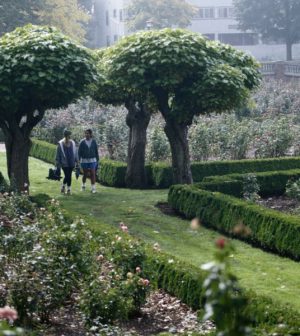- Could Your Grocery Store Meat Be Causing Recurring UTIs?
- Are You Making This Expensive Thermostat Error This Winter?
- Recognizing the Signs of Hypothyroidism
- 10 Strategies to Overcome Insomnia
- Could Artificial Sweeteners Be Aging the Brain Faster?
- Techniques for Soothing Your Nervous System
- Does the Water in Your House Smell Funny? Here’s Why
- Can a Daily Dose of Apple Cider Vinegar Actually Aid Weight Loss?
- 6 Health Beverages That Can Actually Spike Your Blood Sugar
- Treatment Options for Social Anxiety Disorder
More Green Space May Mean a Healthier Heart

Living in a neighborhood with lots of greenery just might protect your ticker.
“Our study shows that living in a neighborhood dense with trees, bushes and other green vegetation may be good for the health of your heart and blood vessels,” said study author Aruni Bhatnagar, director of the University of Louisville’s Diabetes and Obesity Center.
For the study, Bhatnagar and his colleagues looked at the effect of neighborhood green space over five years among people who were seen at the University of Louisville’s outpatient cardiology clinic.
Most of the participants were at risk for developing cardiovascular disease. During that time, the researchers collected blood and urine samples from 408 people of varying ages, ethnicities and socioeconomic levels.
They assessed these samples for markers of blood vessel injury and the risk for cardiovascular disease. They also measured the density of the green space and levels of air pollution where the participants lived.
Bhatnagar’s team found that in neighborhoods with more vegetation, people had lower levels of epinephrine in their urine, which indicates lower levels of stress.
The investigators also found lower levels of F2-isoprostane in the participants’ urine, which indicates less oxidative stress and better health. The study also showed that folks from greener spaces had greater ability to repair blood vessels.
The association with epinephrine was greater among women, people who had not previously had a heart attack, and those not taking beta blockers, which are drugs that reduce blood pressure and the heart’s workload.
The findings were independent of age, sex, ethnicity, smoking habits, economic conditions, use of statins and exposure to roads, the researchers said.
But the study did not prove that greenery caused heart risks to drop; it only observed an association.
The report was published online Dec. 5 in the Journal of the American Heart Association.
“Indeed, increasing the amount of vegetation in a neighborhood may be an unrecognized environmental influence on cardiovascular health and a potentially significant public health intervention,” Bhatnagar said in a journal news release.
More information
The American Heart Association has more on risks for heart disease.
Source: HealthDay
Copyright © 2026 HealthDay. All rights reserved.










